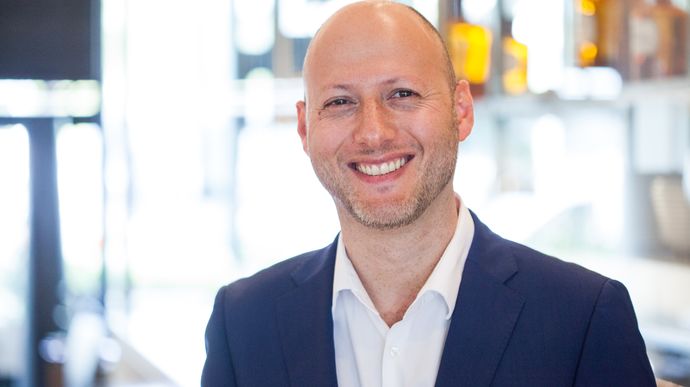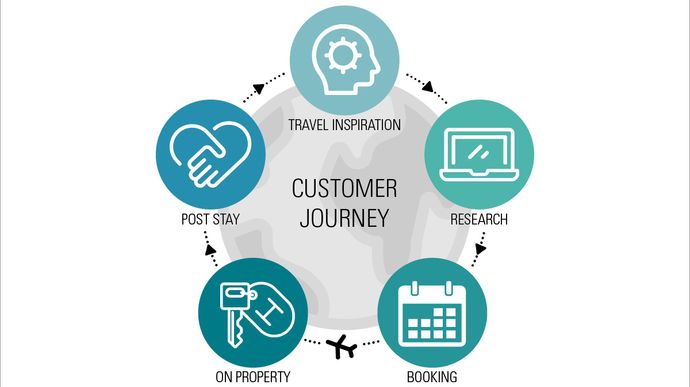INTERVIEW WITH ANDREAS WESTERBURG
Head of Development, Best Western Hotels Central Europe

New apps and software mean that anyone can make a booking with just a few clicks, and the choice of hotels all over the world is seemingly endless – and then you have Airbnb.
Andreas Westerburg, Head of Development for Best Western Hotels Central Europe, gives us a glimpse behind the scenes at Best Western, talking about development strategies, sustainable expansion, the question of Airbnb, and the outlook for the future.
Head of Development
1. What does the title of Head of Hotel Development & Hotel Services mean to you, and what is your strategy for the continuing development of Best Western Hotels & Resorts?
As Head of Development & Hotel Services, I am responsible, together with my team, for the expansion of our Group, which includes a total of 10 hotel brands in the 10 countries of Austria, Croatia, the Czech Republic, Germany, Hungary, Liechtenstein, Luxembourg, Slovakia, Slovenia and Switzerland. Strategically, we are focusing on the expansion of all our brand offerings – in Germany, Europe and worldwide. To that end, the commercial success and competitiveness of our partner hotels are paramount. We are service partners for our hotels. Our range of brands means hotel operators, hotel owners, developers and investors can choose the right concept for their own hotel business to enable them to meet the needs of their particular market. With our Hotel Services division, we can anticipate the needs and requirements of our guests, and therefore of our hotels, at an early stage and provide them with the support, advice and customised solutions that they need.
2. GCH has a total of 10 Best Western hotels in its portfolio. In your position, what makes GCH a good partner? What does good hotel management look like to Best Western?
We really value our long-standing collaborative partnership with the GCH Group and we are keen to continue growing together. For us, GCH is a reliable and professional partner that always responds to our requirements quickly and efficiently, in terms of both quality and services. There is a great deal of synergy between our local hotels and our national and global sales and marketing activities. Ultimately, we want to be able to use our central services and tools to free up our partner hotels, so that local operational management can concentrate primarily on the guest and the hotel’s service offering.
Quality management
3. Quality management also falls within your remit. Are rapid expansion and maintaining quality mutually exclusive?
Sustainable expansion of the right hotels is always a priority. The rate of growth is not our key concern – the quality needs to be right, and the hotel must also be the right fit for our portfolio. Our extended brand offering means that we are seeing considerably bigger and faster opportunities for growth, as we can offer solutions with an appropriate brand affiliation for different categories and types of hotel.
4. What is the quality management philosophy in your team?
Our global quality management system defines the required standards and design concepts, and then ensures they are implemented consistently, monitored and observed. Guests and their needs are at the heart of our quality management approach, so it is our job to spot market trends and evolving demands as early as possible. We allow our hotels as much individuality as possible while, at the same time, ensuring that the same quality standards are maintained on a global level. For example, as part of our global quality standards, we now offer free high-speed Internet access, flat-screen TVs, multilingual staff and a worldwide loyalty programme – all things that guests expect from a hotel these days.
Hotel-like operators: Airbnb
5. Airbnb recently announced that it would also like to list hotels on its platform in the future. What do you think of this development? And what is your role in helping Best Western to hold its ground against Airbnb?
Airbnb has become very powerful and, at first glance, may seem an attractive prospect to many hotels, given its reasonable commission rates. But we must beware. I remember that the established OTAs all started with commission rates of 5%, but independent hotels now pay more than 20% commission on average. Our strategy is to continue to build up our direct sales and concentrate on our strengths. As a hotel operator we can offer many benefits that private providers cannot – for instance, in terms of safety and hygiene standards, as well as services for guests. We should keep an eye on Airbnb as a competitor but also learn from it where appropriate. Trends like the interest in socialising and community are not just applicable to Airbnb – they can also be leveraged for new hotel concepts. What annoys me about Airbnb is that almost 50% of hosts who offer accommodation these days are professional providers, but they don’t have to comply with the same restrictions and requirements that we hoteliers do. The requirements that I’m thinking about here include fire protection, taxes and much more. In other words, they are competing with hotels but they are playing by completely different, much more lenient rules. That’s not right – there should be a level playing field.
6. How is your digital strategy/online marketing tackling the migration of the young-traveller and business-traveller target groups?
We continuously review our sales strategies and constantly adapt our sales channels to take account of changes in target groups and booking methods. So it’s about testing and using new sales channels. In this respect, we have always taken the lead and we continue to do so today. As a hotel brand, we have never shied away from exploring new ground. Today, we have a strong presence on all relevant online and social-media channels, as well as a solid e-commerce strategy, so we are managing to reach new target groups, including young travellers, in all the right ways. But we are also continuing to develop our product offering, such as our Vib boutique-hotel concept, which is aimed at millennials and is attracting a younger, tech-savvy target group to our brand. It’s about understanding the requirements of those travellers (technology, socialising, sustainability) and being able to advise our hotels on the features that are most likely to result in a decision to book.
7. Can you share your vision for the future with us?
With regard to the global hotels market, I expect to see further consolidation in the future – in other words, the big players will get even bigger. This presents significant challenges for independent hotels and mid-market hotel groups in particular. However, I am certain that there will always be a demand for independent hotels offering a personalised service. And ultimately, that’s what our brand stands for: diversity and quality that you can rely on, rather than uniformity and standardisation. For this reason, I believe the outlook for our business and our brand is positive, and that we are equipped to meet the challenges of the future.
In conclusion
8. What are your top European destinations for 2019?
Given the number of ongoing crises around the world, as well the uncertainties that surround air travel, we are noting an increasing trend towards land-based trips, as well as travel within Europe. Right at the top of the list is Germany – both for city breaks and as a holiday destination. But classic Mediterranean destinations like Spain, Greece, Italy and Croatia remain as frontrunners. We are also seeing a growing demand for previously undiscovered destinations, especially in Eastern Europe – places such as Slovenia, Slovakia, Hungary and the Czech Republic.
9. What is your personal ‘bucket-list’ destination?
I travel a lot for my job, both within Europe and around the world. But when it comes to holiday travel, right at the top of my list is ‘pure nature’ – it doesn’t matter where! I can honestly say that I am at my happiest surrounded by forest!
Thank you for the exciting conversation!
All Best Western Hotels of the GCH Hotel Group can be found here!
Editor: Christina Hahn










